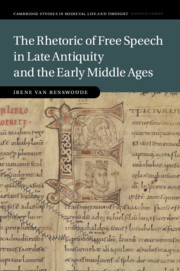Book contents
- The Rhetoric of Free Speech in Late Antiquity and the Early Middle Ages
- Cambridge Studies in Medieval Life and Thought Fourth Series
- The Rhetoric of Free Speech in Late Antiquity and the Early Middle Ages
- Copyright page
- Dedication
- Contents
- Acknowledgements
- Abbreviations
- Introduction
- Part I
- Part II
- 6 The Frank Holy Man
- 7 Gregory of Tours
- 8 The Wise Adviser
- 9 Agobard of Lyon
- 10 Pope Gregory
- Epilogue Part II
- Bibliography
- Index
6 - The Frank Holy Man
from Part II
Published online by Cambridge University Press: 23 September 2019
- The Rhetoric of Free Speech in Late Antiquity and the Early Middle Ages
- Cambridge Studies in Medieval Life and Thought Fourth Series
- The Rhetoric of Free Speech in Late Antiquity and the Early Middle Ages
- Copyright page
- Dedication
- Contents
- Acknowledgements
- Abbreviations
- Introduction
- Part I
- Part II
- 6 The Frank Holy Man
- 7 Gregory of Tours
- 8 The Wise Adviser
- 9 Agobard of Lyon
- 10 Pope Gregory
- Epilogue Part II
- Bibliography
- Index
Summary
This chapter discusses the lives and letters of saints and bishops who were considered truth-tellers by their contemporaries. The selected letters and saints’ lives were written in Francia between c. 550 and c. 750. In addition, two hagiographic texts and one letter from Italy and Visigothic Spain are included to compare developments in Merovingian Francia with other kingdoms and regions of the former Western Roman empire. In the selected sources we encounter Gallo-Roman, Frankish, Visigothic, Anglo-Saxon and Irish holy men who ventured to criticise those in power. Although the rhetoric of these truth-tellers and the vocabulary of their biographers do not conform to classical standards, this chapter demonstrates that their frank speech and behaviour was very much related to the late antique tradition of free speech.
- Type
- Chapter
- Information
- Publisher: Cambridge University PressPrint publication year: 2019

